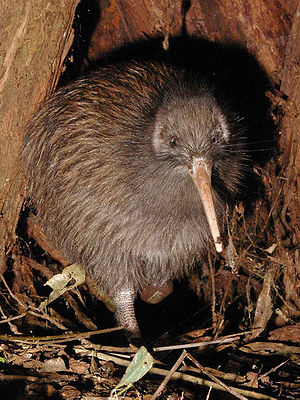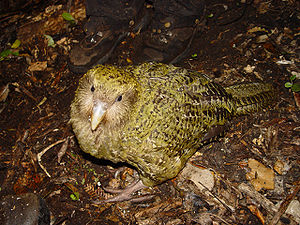 Image via WikipediaApparently, New Zealand birds have a body odor problem. This could be a reason why so many native NZ birds are either extinct or on the threatened species list. Associate Professor Jim Briskie from the University of Canterbury has been awarded a Marsden grant to study the role of smell in the lives of NZ native birds.
Image via WikipediaApparently, New Zealand birds have a body odor problem. This could be a reason why so many native NZ birds are either extinct or on the threatened species list. Associate Professor Jim Briskie from the University of Canterbury has been awarded a Marsden grant to study the role of smell in the lives of NZ native birds. The birds of New Zealand evolved for millions of years without mammalian predators such as rats, short-tailed weasels, cats and possums. Behavioral traits, such as nesting on the ground, left birds vulnerable to introduced mammals. But in other countries, birds live with mammals and seemingly behave much as our birds do. So have we been missing something?
Associate Professor Briskie suspects the missing link is smell. Kiwi have been described as smelling like mushrooms or ammonia; kakapo like “musty violin cases”. Many mammals are especially adept at detecting odors and a rat or weasel smelling a kiwi gets a “potential meal” alert.
Briskie, a Canadian, who moved to New Zealand 13 years ago, said his research could potentially lead to innovative technology, such as odor-eaters for bird nests. "Down the line if we do find some species are particularly smelly or vulnerable, perhaps I can design a deodorant for kiwis."
 Image via Wikipedia
Image via WikipediaPreliminary work has revealed that these odors arise from the preening waxes that birds use to maintain their feathers. Birds elsewhere seem to have less pungent odors, and they suppress the smelly waxes produced by their preen glands while nesting.
New Zealand birds and their preen gland waxes will be studied and compared with related species in Australia that evolved in the presence of mammalian predators. Associate Professor Briskie will also conduct laboratory and field trials to see whether predators use smell to more easily locate island birds than their continental cousins.
This study will, for the first time, determine whether odors are playing a previously unrecognized role in the decline of island birds.
Total Funding (over 3 years): $607,702
Principal researcher: Associate Professor Jim Briskie, School of Biological Sciences, University of Canterbury
Source: 2010 Round Press Releases http://www.marsden.royalsociety.org.nz/
Category ›
Quick fun Facts
 Unknown
Unknown
 Sunday, September 26, 2010
Sunday, September 26, 2010










No comments:
Post a Comment